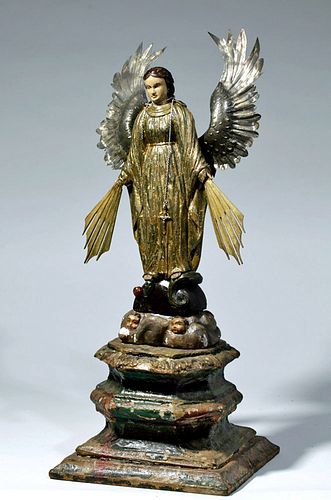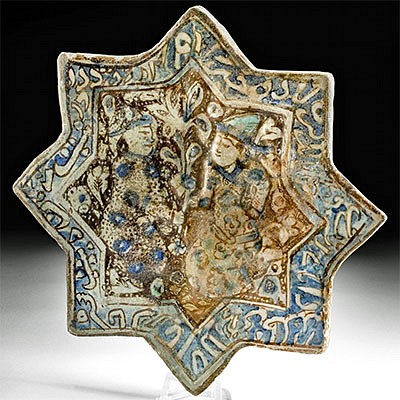18th C. Spanish Colonial Santo - Garden of Eden Angel
Lot 315
About Seller
Artemis Fine Arts
686 S Taylor Ave, Ste 106
Louisville, CO 80027
United States
Selling antiquities, ancient and ethnographic art online since 1993, Artemis Gallery specializes in Classical Antiquities (Egyptian, Greek, Roman, Near Eastern), Asian, Pre-Columbian, African / Tribal / Oceanographic art. Our extensive inventory includes pottery, stone, metal, wood, glass and textil...Read more
Estimate:
$4,000 - $6,000
Absentee vs Live bid
Two ways to bid:
- Leave a max absentee bid and the platform will bid on your behalf up to your maximum bid during the live auction.
- Bid live during the auction and your bids will be submitted real-time to the auctioneer.
Bid Increments
| Price | Bid Increment |
|---|---|
| $0 | $25 |
| $300 | $50 |
| $1,000 | $100 |
| $2,000 | $250 |
| $5,000 | $500 |
| $10,000 | $1,000 |
| $20,000 | $2,500 |
| $50,000 | $5,000 |
| $100,000 | $10,000 |
| $200,000 | $20,000 |
About Auction
By Artemis Fine Arts
May 20, 2021
Set Reminder
2021-05-20 10:00:00
2021-05-20 10:00:00
America/New_York
Bidsquare
Bidsquare : Ancient & Ethnographic From Around The World
https://www.bidsquare.com/auctions/artemis-gallery/ancient-ethnographic-from-around-the-world-6979
Ancient art from Egypt, Greece, Italy and the Near East, as well as Asian, Fossils, Pre-Columbian, Native American, African / Tribal / Oceanic, Fine art, and much more! All categories, all price ranges... all legally acquired and guaranteed to be as described or your money back. Artemis Fine Arts info@artemisgallery.com
Ancient art from Egypt, Greece, Italy and the Near East, as well as Asian, Fossils, Pre-Columbian, Native American, African / Tribal / Oceanic, Fine art, and much more! All categories, all price ranges... all legally acquired and guaranteed to be as described or your money back. Artemis Fine Arts info@artemisgallery.com
- Lot Description
New World, Spanish Colonial, Mexico, ca. 18th century CE. A relatively rare hand-carved, finely painted, and gilded wooden Santo depicting one of the angels God assigned to guard the Tree of Life after he expelled Adam and Eve from the Garden of Eden. Her figure is draped in golden robes; finely cut, modeled in repousse, and detailed with incised feathers gilt tin wings are attached to her back and golden rays emanate from her hands. A worshipper placed a gold/silver tone crucifix on angel to venerate her. Size: 8" L x 12" W x 20.5" H (20.3 cm x 30.5 cm x 52.1 cm)
Representing the Garden of Eden, she alights upon a mound inhabited by the symbolic serpent and apple, and two additional cherubim created and placed by God in the Garden appear in the clouds below. Complementing the Santo is a multi-tiered pedestal, its classicized style characteristic of the Spanish Baroque. In the story of the Expulsion, God expelled Adam and Eve from the Garden of Eden lest they eat from the Tree of Life and gain immortality. To guard the tree, "to the east of the Garden of Eden he stationed the cherubim and a sword whirling and flashing." The santero of this santo captured this reference in the iconography.
Santos played an important role in bringing the Catholic Church to the New World with the Spanish colonists. These religious figures were hand-carved and often furnished with crowns, jewels, and other accessories, usually funded by religious devotees, and were used as icons to explain the major figures - Mary, Christ, and the saints - to new, indigenous converts. Likewise, they served as a connection to the Old World for Spanish colonists far from home. Many of them were lovingly cared for over the years, with repairs and paint added as they aged, and played an active part for a long time in the religious life of their communities. Oftentimes regarded as quite valuable and expensive, the creation of Santos was usually funded by religious devotees.
Provenance: private Francis & Lilly Robicsek Collection, Charlotte, North Carolina, USA, acquired second half of the 20th century
All items legal to buy/sell under U.S. Statute covering cultural patrimony Code 2600, CHAPTER 14, and are guaranteed to be as described or your money back.
A Certificate of Authenticity will accompany all winning bids.
We ship worldwide and handle all shipping in-house for your convenience.
#120468Wings show expected tarnish and minor bending. Some losses to billowing clouds surrounding cherubim and back of earthmound inhabited by serpent. Old nails attaching wings are still present, but new screws added later to secure. Expected surface wear commensurate with age, with losses to pigment and gold leaf and tiny nick to left sleeve. The flat back of her head with traces of wax suggests a former attachment. Wear, age cracks, and losses to pedestal as shown. Crucifix chain missing catch. Ray on right hand has been reattached.Condition
- Shipping Info
-
All shipping is handled in-house for your convenience. Your invoice from Artemis Gallery will include shipping calculation instructions. If in doubt, please inquire BEFORE bidding for estimated shipping costs for individual items.
-
- Buyer's Premium



 EUR
EUR CAD
CAD AUD
AUD GBP
GBP MXN
MXN HKD
HKD CNY
CNY MYR
MYR SEK
SEK SGD
SGD CHF
CHF THB
THB

















